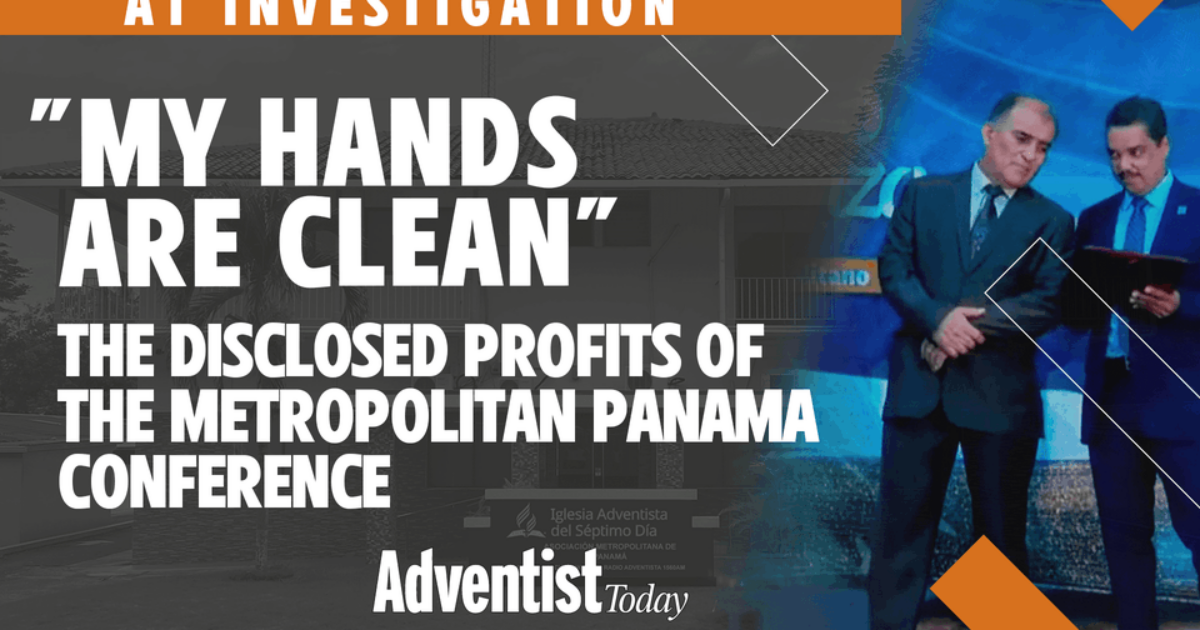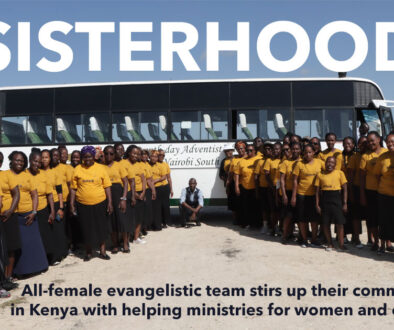Continuing Financial Accusations in Panama Metropolitan Conference
2 February 2023 |
In September 2022, Mr. Abdiel Guerra was removed from his position as treasurer of the Metropolitan Adventist Conference of Panama (AMAP), after being charged with embezzlement of an amount around US$250,000.
At a zoom meeting with all the church elders in the Conference, President Eluvinio Castrellón disassociated himself from the situation and said he had no responsibility: “My hands are clean, and I am innocent until proven guilty.”
Subsequently, though, several sources contacted Adventist Today to provide evidence that the dealings of other officers and leaders weren’t as clean as Elder Castrellón claims. They showed Adventist Today a number of internal documents, including invoices, checks, bank accounts, transfers, and payroll payments that showed high levels of financial activity that involved Elder Castrellón, his associates, and his family.
Unusual salaries & benefits
Among the documents that sources provided to Adventist Today is an annual Salaries and Benefits Budget for AMAP employees for 2022, which you can see here.
Eluvinio Castrellón, president, shows a monthly salary of US$1,392; however, with the additional allowances his annual compensation is US$82,226.
Not all of this is take-home pay—just like elsewhere, this sheet shows some benefits that are paid on the employee’s behalf, such as social security and medical.
Several numbers stand out, however. Elder Castrellón’s per diem local travel—paid whether or not it is used—is US$19,200. In addition, the president receives an annual rent allowance of US$9,120, even though he owns his own house. AMAP also pays Castrellón US$5,760 annually for the use of his car.
Mrs. Fulvia Ester Rodriguez, Pastor Castrellón’s wife, has an annual compensation (between salary and allowances) of $38,041. She is listed as the Director of Women’s Ministry and SIEMA (International Society of Adventist Ministers’ Wives). Among the allowances, Mrs. Fulvia receives US$3,300 a year for per diem and gasoline, in addition to US$5,760 a year for her car—although, as sources told Adventist Today, she doesn’t have a car.
The two Castrellóns’ combined annual compensation is US$120,267—equivalent to the tithe collected in one month from all the churches in the Conference.
Eveth Gonzalez, who was the Executive Secretary until October 2022, a position he left to accept the presidency of the Central Panama Conference, reported annual compensation of $81,462. Again, a large portion of that—US$25,200 per year— was per diem and gasoline allowance.
Tomas Saenz, AMAP’s current interim secretary-treasurer, receives the compensation given up by Abdiel Guerra, amounting to $81,000 per year.
In comparison, an experienced Panama City pastor’s total compensation package is around US$50,000, or US$30,000 for a new pastor. Noteworthy is the difference in the local per diem travel budget, which for the administrators is around US$19,000, but for pastors is US$2,700.
Why aren’t these outsized benefits and bonuses checked by the conference’s Executive Committee? Sources explained to Adventist Today that the salary details are not presented to the Executive Committee. The budget is arranged by a “budget commission,” which meets privately. This commission is composed of AMAP administrators and Union administrators, including Pastor Jóse DeGracia, president of the Panama Union Mission (UMAP). The committee only brings the total to the Executive Committee to be voted on without questions or explanations.
The 2022 salary budget was US$1,265,616.
Virtual audits
Following the alleged US$250,000 embezzlement and Adventist Today’s widely read report about it, it was inevitable that there would be an audit. AMAP leaders were first asked to scan all the financial statements to send to the auditors at General Conference Auditing Service (GCAS). This virtual audit was with followed up with GCAS auditors working in Panama City from December 12 to 16.
Before auditors arrived, administrators and the accounting assistants undertook to do a cleanup of the accounts. They were to separate payment documents (deposits, drafts, transfers) with support from those that had no fiscal invoice as support.
Some of the invoices appeared to be invented. For example, on March 30, 2021, Pastor Castrellon introduced an invoice that he made up himself by hand, without any support, with the description: “payments made by Eluvinio Castrellon,” and the order: “Deposit to his account.” The amount was US$4,499.12 (to see all documents and evidence, CLICK HERE). Also, the sources showed a check made out to Pastor Castrellon in the amount of US$24,000, with only the description: “Reimbursement.”
The last audit had been in 2019, in which year, according to sources, GCAS rendered an adverse opinion. Sources say that the GCAS auditors have again confronted Castrellón with another adverse opinion.
Family work
Related to this, Mr. David Castrellón, son of the president of AMAP, has exclusive contracts for maintenance, cleaning, and simple construction in the institutions and churches of the Conference, where he works with a small team of other family members. Invoices, say insiders, showed ambiguous descriptions and contracts awarded without estimates or comparisons. The checks were drawn in most cases in the name of David Castrellón, though some were paid to the president of AMAP himself, David’s father. Sources alleged that contracting for larger construction projects is sometimes directed by the elder Castrellón, and several amounts were deposited directly into his bank account.
The Working Policy of the Inter-American Division and the General Conference has a clear conflict of interest policy (“O 48 Conflict of Interest and/or Commitments”) that regulates business dealings that conflict with a person’s position of authority in the organization. This includes both awarding business to oneself by virtue of position, and restrictions on awarding work to family. Violation leads to “disciplinary action, up to and including termination of employment.”
The year-end report
Mr. Tomas Saenz was installed as interim treasurer and executive secretary in October 2022, and in November presented a year-end report and budget for 2023, where cuts and adjustments were made for the Executive Committee to see a budget readjustment, sources said. Although Mr. Saenz did not detail the salaries of AMAP’s administrative leadership for the committee, he did emphasize the need to save and eliminate unnecessary expenses to close the US$250,000 gap left by the embezzlement. The members of the Board of Directors were given a financial report, which was taken away from them after they looked at it.
After the payment of debts and salaries, the budget leaves AMAP with US$15,000 per month for other operations, said the sources.
Among the achievements reported by Elder Castrellón to the Executive Committee were three humanitarian flights to return Venezuelan immigrants to Venezuela—which were paid for not by the Conference but by a donor. The same was true of food delivered by the Conference during the pandemic crisis, which was in fact donated by the Panama Food Bank, thanks to the efforts of a pastor. The Conference repackaged the food in ADRA bags, representing them as church donations to the needy. The impression was given that these were initiatives of the conference, using Conference money.
Meanwhile the Inter-American Division has ordered AMAP’s quadrennial constituency meeting to be postponed until further notice. No explanations were given to the churches who have already elected delegates.
The outgoing treasurer
Sources have alleged that Mr. Abdiel Guerra, the treasurer who was accused of embezzling $250,000, had been previously involved in a questionable financial situation in Southeast Panamanian Conference, where he had also been serving as treasurer. His hiring at AMAP was promoted by Elder José De Gracia, Mr. Guerra’s uncle and president of the Panama Union (UMAP).
As for Mr. Abdiel Guerra, Mr. Saenz reportedly explained that according to Panama’s labor laws, employees were to receive a settlement after an “unjustified” dismissal, and this was done for Mr. Abdiel Guerra. This was objected to by some board members, who said that in case of embezzlement the employee should not receive a settlement—that dismissal was justified!
Sources showed Adventist Today the voucher of the dismissal settlement in the amount of US$70,000, though another consulted source explained that this money was not actually disbursed to Mr. Guerra, but was deducted from the US$250,000 he embezzled.
Why an “unjustified” dismissal instead of a dismissal for cause? A source consulted by Adventist Today explained that if AMAP fired Mr. Abdiel Guerra with cause—that is, for having embezzled money—the matter would go to court, where both parties had to present themselves with their lawyers. This source felt that AMAP leaders didn’t want the legal system reviewing the rest of AMAP’s finances, which would assuredly happen if the embezzlement were prosecuted.
When committee members were asked what was being done to recover the funds, they were told that there was a formal signed commitment for the return of the money. When one member asked to see it, she was told that they had not brought the document and that it would be shown at another meeting.
Adventist Today was able to confirm the existence of such an agreement, but it is not clear that it has any authority: since the dismissal is classified as “unjustified”, it means that the treasurer is legally regarded as innocent, which makes it impossible for AMAP to enforce the collection of the embezzled funds.
One source said that a possible strategy was to tell the delegates at the quadrennial constituency meeting that they had already recovered 70 thousand dollars—without telling them that that was only by subtracting the dismissal settlement from the total!
Christ’s methods?
On repeated occasions, some conference administrators appeal to the “methods of Christ” to solve the problem. While that sounds generous and kind, it appears to be a way to justify silence and lack of transparency. To date, the members of the churches in AMAP have not received an apology; on the contrary, interim treasurer Tomas Saenz told churches in Chanis and La Pulida, “Among the people of God there has always been corruption,” but “We should not be troubled about these issues because God is the one who will put everything in order,” and “We should not attack or question God’s anointed.”
Instead of talking about the steps they are taking to make sure such things don’t happen again, they are hiding behind the toothless agreement that the embezzled money will be returned. Sources also say that officers admit they are disappointed that they’ve not been able to keep these matters under wraps—that too much information has gotten out to the laity.
Conclusion
AMAP has 25,795 members, according to the latest statistics from the Office of Archives, Statistics, and Research of the General Conference. Most of the members of the churches are lower middle class. Many churches in the Conference do not have good church buildings, children’s rooms, or even bathrooms. Some were built by donations from Maranatha volunteers.
It appears to Adventist Today that the reason things like this continue to happen in Latin America has to do with a model that does not allow true representation from the laity. Leaders are able to delay, hide facts from constituent members, and take unilateral action without consultation, and lay representatives have no voice. Hiding financial details should be sufficient reason for leaders to be removed from their positions according to policy.
The authority should not lie with the pastors or administrators, but with the laity duly elected by local churches. These are the true custodians of the conference’s funds.




